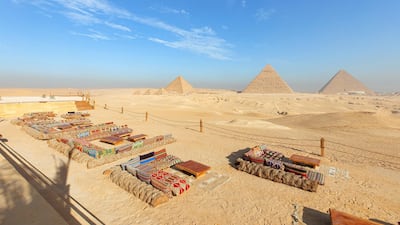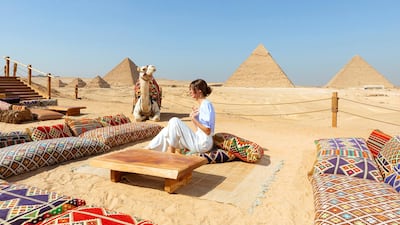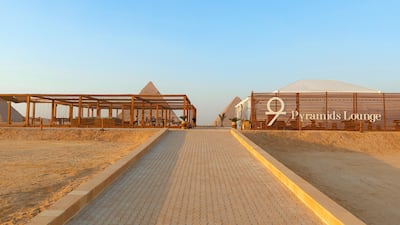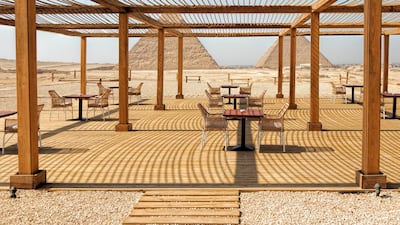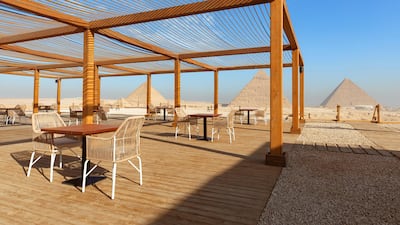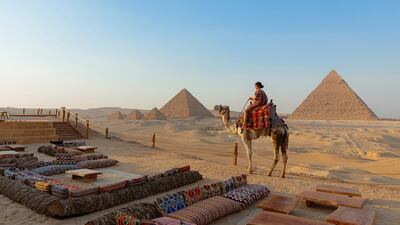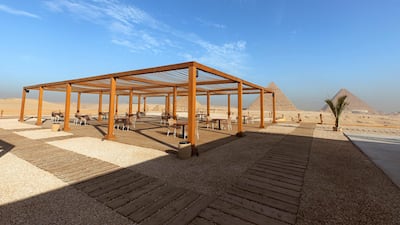Lesson number one when visiting 9 Pyramids Lounge, the first restaurant on Egypt's Giza Plateau: don't follow Google Maps. Lesson number two: expect to get out of your car while it is searched and walk to the ticket office to buy entrance permits to the Pyramids site.
The view
When you arrive, though, it will all be worth it for the Instagram-ready view that is hard to beat: the three majestic Pyramids surrounded by nothing but desert, a unique selling point. It is little wonder that since 9 Pyramids Lounge opened in October, weekends have been fully booked for weeks in advance.
"You can't find this view anywhere else in the world," says Hesham Gadallah, chief executive of Orascom Pyramids Entertainment, a subsidiary of Orascom Investment Holding.
The restaurant has already welcomed Yasser ElKady, former Egyptian minister of communications and information technology; Major General Mohamed Amin, presidential adviser for financial affairs; Osama Heikal, Egyptian state minister of media and information; Tarek Kabil, former Egyptian minister of trade and industry; and Khaled El-Enany, Egyptian minister of tourism and antiquities.
Guests also include famed Egyptologist Zahi Hawass, Netflix star Kori Sampson and food blogger Ramy Soli, who posted a clip of the restaurant's food on Instagram.
The restaurant
"The best thing about 9 Pyramids Lounge is there is no building – it's a light structure to be able to preserve the nature of the place," says Ashraf Mohie El-Din, Egyptologist and director general of the Pyramids site.
The restaurant, on the southern side of the Pyramids, comprises five indoor and outdoor spaces on an area of 1,341 square metres: a grand tented lounge, a relaxing outdoor majlis and three outside courtyard terraces. The wooden structure and its subtle hues blend in with the surroundings.
Its name refers to the Great Ennead, a group of nine deities in Egyptian mythology worshipped at Heliopolis. The logo also combines the number with the ankh symbol, representative of eternal life.
The food
The restaurant serves breakfast from 9am and lunch from noon with the last order at 3.30pm. The food includes classic mezze, such as baba ghanoush and stuffed vine leaves; grills, such as shish taouk and kofta; and Egyptian specialities, such as the pastry feteer meshaltet and Umm Ali for dessert.
"It's not over-commercialised," says Gadallah. "That's why we named it a lounge. There are no sophisticated heavy meals – no filet poivre. It's a light thing."
The price
9 Pyramids Lounge has mid-range prices. A set Egyptian or western breakfast costs 175 Egyptian pounds ($11), excluding an added 12 per cent service charge and 14 per cent value-added tax. Main courses for lunch range from 75-175 Egyptian pounds.
Entry costs 30 Egyptian pounds for Egyptians and 200 Egyptian pounds for everyone else.
Reservation woes
Given how overwhelmed the restaurant has been in its first few months of opening, there have been complaints on social media about the reservations system. One Facebook user wrote: “I called several times to book for April and they told me that April booking is not open and March is fully booked.”
9 Pyramids Lounge has added phone lines to cope with demand, but said it is receiving hundreds of calls a day. This is why reservations are essential and no walk-ins are allowed. As outlined on the restaurant's social media pages, visitors must pass through security checks before picking up entry tickets to the site.
The venue is also available to book for private and public events.
The challenges
Holding company OIH, led by Egyptian business tycoon Naguib Sawiris, signed a 15-year contract with the Ministry of Tourism and Antiquities in December 2018, giving it the rights to operate and provide facilities and services to visitors to the Giza Pyramids.
El-Din says plans to improve the site's facilities started at the government level in 2009, but stalled until 2016, after El-Enany became the minister of antiquities. Following two years of talks with several companies, the ministry signed the contract with OIH, which invests in telecoms, financial services and selective urban development projects in Egypt and Africa.
“It’s not an easy task, because it’s an archaeological area that needs to be preserved,” El-Din says.
9 Pyramids Lounge is the first step in the 301 million Egyptian pound ($19.16m) project to develop the Unesco World Heritage Site and improve the experience for tourists.
It is a revamp that is much-needed for one of the world’s most-visited tourist attractions, but even more so as Egypt tries to drum up a tourism industry hit by the Covid-19 pandemic. Only 3.4 million tourists visited the country in 2020, compared to 13 million in 2019.
An eye to the future
A pilot electric bus, to move guests through seven stations around the plateau, has been tested and the first batch of e-buses is expected to be delivered in the second half of this year.
Some of the other improvements in the works include: permanent shade structures, updated toilet facilities, fixed prices for horse and camel rides, food and retail outlets, cultural events, a mobile app and a new visitor centre.
“We are very eager to turn this vision into reality because of our strong sense of belonging and our belief that this site deserves to be presented to the world in a way that is worthy of the last remaining Ancient World Wonder,” says Gadallah.
OPE is also planning to open an Italian restaurant, an Oriental restaurant and a cafe this year in a building originally built in the 1960s on the north-western side. Seven food outlets in total will be housed in the former storage facility, which has been redesigned and renovated.
Retail outlets will focus on Egyptian manufacturers and there will be “no food trucks, all light structures with no branding”, Gadallah stresses.
As for Ramadan, 9 Pyramids Lounge is working on adjusting its operations to serve iftar, but must first get permission from the government to extend its hours. An announcement will be made imminently on social media.
The pandemic has caused delays, and processes take time as each step involves many different parties – from Unesco to government officials to experts in the field.
“We engage everybody," says Gadallah. “Egypt is just managing the place, but it’s owned by the world, so we have to preserve this image.”
